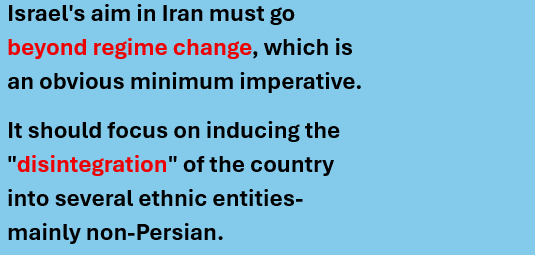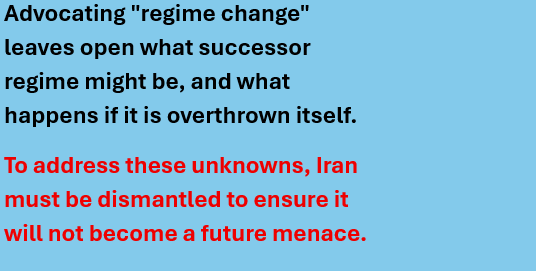Peloni: The various minorities in Iran should each pursue control of the territories on which they each reside within Iran, and upon having done so, the relative minorities should each declare these territories as independent from the Iranian state. Freeing the dominion over the minority regions by an overriding ruling organization or authoritarian will protect and empower the relevant minorities, but it will also diffuse the centralized power and authority which made possible the Ayatollahs’ dreams of world domination over the past fifty years remotely possible.
Martin Sherman





@Michael
Nonsense. That is a silly and false claim.
I notice that US President Trump is standing next to Turkish President Erdogan:
https://youtu.be/_h9Bewo8bts?list=PLlTLHnxSVuIyCAx4TDbyonXJ_hEVPqT5J
If anyone here wants to focus on the near future in Iran, this is probably a good place to start.
This short article shows very good, forward thinking. I remember wondering, immediately after I heard of Israel’s attack, if it might not cause enough instability to allow the Iranian Kurds to gain independence. This article looks well beyond that. There are significant religious and ethnic minorities in Iran that could benefit from a breakup of the country. At the present time, however, that is all wishful thinking, since it is becoming increasingly evident that we may not even get regime change. The Iranian leadership has withstood the initial blow and is re-organizing itself, while consolidating its supporters (Russia, China and North Korea). We can say that Israel (and the US) did a good job of stopping the Iranian nuclear weapon program, for a time, but it appears that there was inadequate preparation for bringing about regime change. Maybe that kind of coordination is too ambitious, even for the Mossad or the CIA. Now they certainly have their work cut out for them, and they better up their game. Yes, Iran’s nuclear weapons program has received a substantial setback, but without regime change, (or better yet, break up of the country), things will be back as they were in a short period of time. Israel and the United States will be looking at the same scenario, only next time, Iran will be much better prepared to defend itself, and will be ready to retaliate in a much more painful way.
Hi, Raphael. Thank your for your forward-thinking comment.
I am glad that the Crown Prince is stepping up to the plate and offering the Iranian people an alternative:
https://youtu.be/XADgJtEBRGE
Unless a substantial number of Iranians make a clear choice of the future they want to see, I see only two alternatives for that country:
1. a return of the Islamist tyranny, or
2. a Pahlavi-centered transition govenment.
@Michael
Your #1 is intolerable, but your #2 would be quite tenuous. Importantly, the Iranian super state provides the temptation for overthrow, even if a friendly Iranian govt might come to power. It would be better to have the minorities regions granted their own legitimate states, while leaving the choice of who rules the remaining Iranian state as a less formidable threat to those who might try to impose their own interests over the local populations.
Hi, Peloni. I’ll respond to:
Considering that you and I both are advocates of defending the existence of Medinat Israel, it would be least taxing on my brain if we would apply the same standards to Iran as to Israel. First, a side-by-side comparison of minorities:
Iran — Persians,Azertaijanis, Kurds, Lurs
The Kurds and Persians are ancient peoples, corresponding to the Medes and Persians, respectively. They have a long history of being united: At first, the Medes were ascendant, the the Persians. The Kurds, of course, are largely Sunni and the Persians Shiite.
The Azerbaizanis are a remnant of the Seljuk Turks, who ruled all Iran for a long time. Northern Azerbaizan was conquered by the Russians before gaining independence in the 1990a. Both N. and S. Azerbaijan are Shiites, like the Persians.
The Lurs are called “Mountain Kurds”, but their spoken language is closer to ancient Persian than to Kurdish.. They are believed to be of Elamite and Kassite origin, from pre-Persian times of antiquity, and predominantly Shiite muslims, like the Persians.
The remaining 7% of Iranians, including Arabs, BAluchis and Turkmens, have connections outside Iran.
You have been an advocate of the Russian position, that the Slavs of the former USSR are all Russians. Applying this thinking to iran, the Persians, Kurds, Balochis, and Lurs are all one people, the “Iranians”.. Likewise, the Turkmens and Azerbaijanis are all “Turks”, and the Balochis are all .
Iran therefor consista of two language groups (Iranians and Turks) and two main religious groups (Shiites and Sunnis); and all these groups are accustomed to living in a “One-State” solution., very similar to the situation in Russia-Ukraine and Irael-Palestine..